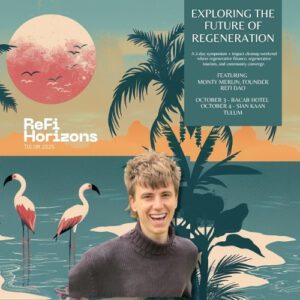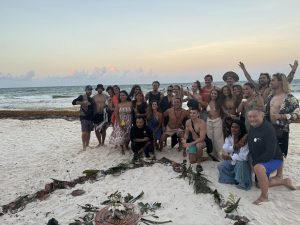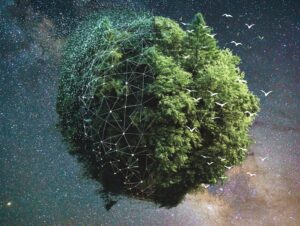As a passionate ocean lover and ReFi Warrior, I’ve been closely following the impacts of climate change on our fragile coastal ecosystems, especially here in the Mexican Caribbean where I live. The recent devastation caused by Hurricane Beryl in Tulum, Mexico has magnified the urgent need to accelerate a diverse array of solutions to protect vulnerable marine life.
The Mesoamerican Reef stretches over 600 miles along the coasts of Mexico, Belize, Guatemala, and Honduras. It is the second-largest and important reef system in the world after Australia’s Great Barrier Reef. 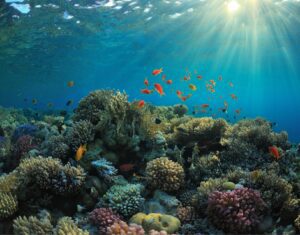 This spectacular underwater wilderness is home to over 500 fish species, 65 types of hard coral, and four species of endangered marine turtles. In Mexico, it is an important tourist center that attracts visitors from around the world and also serves as a main source of food and economic security for a key percentage of the population. The reef and its surrounding mangrove forests and seagrass beds form a tightly interconnected ecosystem that supports the livelihoods of over 1-2 million people in the region.
This spectacular underwater wilderness is home to over 500 fish species, 65 types of hard coral, and four species of endangered marine turtles. In Mexico, it is an important tourist center that attracts visitors from around the world and also serves as a main source of food and economic security for a key percentage of the population. The reef and its surrounding mangrove forests and seagrass beds form a tightly interconnected ecosystem that supports the livelihoods of over 1-2 million people in the region.
Hurricane Beryl recently 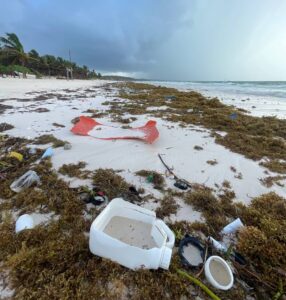 swept through the Yucatan Peninsula, fueled by rising ocean temperatures, and left behind a trail of destruction. But the most alarming aftermath was the deluge of plastic waste that washed ashore, much of it originating from across the world.
swept through the Yucatan Peninsula, fueled by rising ocean temperatures, and left behind a trail of destruction. But the most alarming aftermath was the deluge of plastic waste that washed ashore, much of it originating from across the world.
A Potential Devastating Impact to Sea Turtles
Sea turtle nesting months range yearly from May to October when the females typically return from sea after years swimming the planet’s ocean. This year, Beryl surprised us with a large climate event months before expected, and bringing with it, an influx of plastic pollution that is now posing a grave threat to the sea turtles that call Tulum’s beaches their nesting grounds.
Microplastics, broken down from larger debris, become embedded in the sand, altering the temperature of turtle nests. Even a slight change in nest temperature can skew the sex ratio of hatchlings, with warmer sands producing more females. The impact of this imbalance is far-reaching. Female sea turtles typically spend 13 years at sea before returning to the native beaches of their birth to lay eggs. With the current imbalance, it will be increasingly difficult for these females to find mates, leading to a decline in the overall population and putting into serious risk the overall species survival as a whole.
What To Do if You Encounter a Turtle Nest or Hatching Turtles
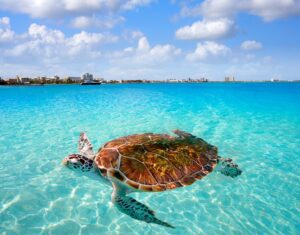
Do Not Touch: Avoid handling or disturbing the turtles, nests, or hatchlings.
Avoid Flashlights: Do not use flashlights or take photos with a flash, as this can disorient and stress the turtles.
Keep a Distance: Observe from a distance to minimize stress on the animals.
Report to Authorities: If you find a nest or hatchlings, contact local wildlife authorities or a conservation organization for guidance.
The Importance of Action
ReFi Tulum, an organization which focuses on accelerating regenerative initiatives in Tulum and beyond, recently organized several actions in anticipation of the hurricane, as well as in post emergency cleanups in response to the devastating impact of the Hurricane on Tulum. We called on our action group, the Guardians of Nature to mobilize in support of our community. Between our two cleanups, we were able to remove 366 kilograms of plastic waste from the affected beaches. Another ReFi action also had volunteers housing several street dogs and cats as well as sterilizing and providing housing till adoption.
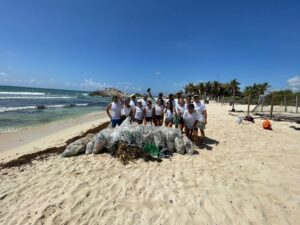
Each of our participating Guardians of Nature will be awarded with Petgas coins, which can be used at several locations in Tulum for the purchase of goods, services, food, and even festival tickets.
Implementing climate adaptation strategies using innovations like Petgas fosters positive environmental actions while providing efficient energy solutions for the community. Transforming plastic into fuel not only prevents ocean pollution but also offers a cleaner, more sustainable alternative to current waste disposal methods. Another benefit is that the company is able to transform any type of plastic, even candy wrappers and old degraded plastic that we often find at our beach cleanups.
Putting Circular Models into Play
In collaboration with our partners, we aim to power our on-ground activities with these plastic-derived fuels and incentivization strategies. These actions are the foundation for the new economy we are building in Tulum, promoting new value exchanges and establishing proof points for circularity and regeneration.
The success of our emergency cleanups highlight the urgent need for ongoing efforts to address plastic pollution. With the threat of more frequent and intense hurricanes, it is critical that we continue our work to keep Tulum’s beaches clean and safe for vulnerable marine life like sea turtles.
ReFi Tulum’s commitment to regenerative action incentivized with tokens such as Petgas, Tulum Coin, $EARTH, and LFG is the wave where positive actions that protect sealife and our planet flow into exchange for food, services, products, and energy!
The fate of Tulum’s sea turtles is inextricably linked to the health of our planet. By adapting to the realities of climate change and taking bold action to address plastic pollution, we can help ensure that these ancient seafarers continue to grace our shores for generations to come.
Full Disclosure: Author is cofounder of ReFi Tulum and is working in partnership with several organizations listed, however this is not a paid post.


